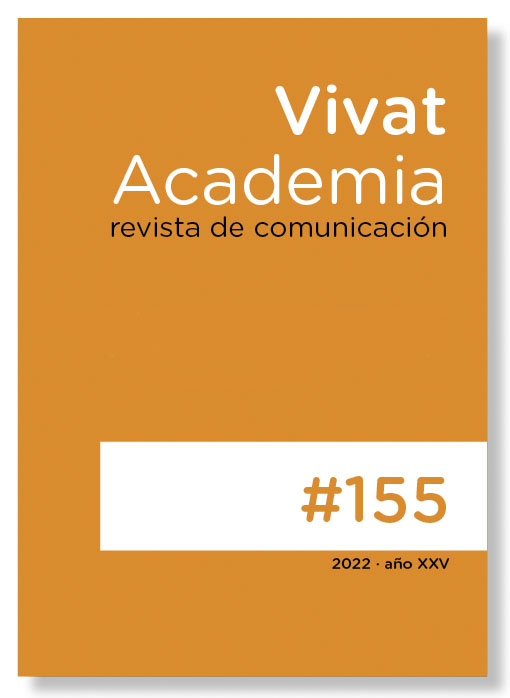Films about the climate emergency: a problem without responsible or solutions
Main Article Content
Abstract
The film industry has opted to include the climatic emergency in its stories, thus configuring a narrative universe in which the spectator negotiates his identity and his own actions through the situations that appear on the screen. Through the application of content analysis, our research aims to reveal the discursive keys on which the film discourse is based, paying attention to the thematic variables represented, the construction of the characters, and the spaces recreated in the productions shown in Spanish cinemas between 2000 and 2019. The results reveal a biased treatment, both in the selection of variables and in the design of characters and settings, presenting a problem that mainly affects the Western population. In line with the above, the cinematic account of the climate emergency presents the same narrative deficiencies as the informative discourse, thus losing a valuable opportunity to transmit sustainable values. To avoid inaction and complacency among audiences, we make a series of recommendations based on contextualizing and empowering civil society through the design of recognizable situations and characters for the audience.
Downloads
Article Details

This work is licensed under a Creative Commons Attribution-NonCommercial-ShareAlike 4.0 International License.
References
Arendt, F. & Matthes, J. (2016). Nature documentaries, connectedness to nature, and pro-environmental behavior. Environmental Communication, 10(4), 453-472. https://doi.org/10.1080/17524032.2014.993415
Brereton, P. (2005). Hollywood utopia: Ecology in contemporary American cinema. Intellect Books.
Carvalho, A. (2010). Media(ted) discourses and climate change: a focus on political subjectivity and (dis)engagement. Wiley Interdisciplinary Reviews: Climate Change, 1(2), 172-179. https://doi.org/10.1002/wcc.13
Corner, A., Roberts, O., Chiari, S., Völler, S., Mayrhuber, E. S., Mandl, S. & Monson, K. (2015). How do young people engage with climate change? The role of knowledge, values, message framing, and trusted communicators. Wiley Interdisciplinary Reviews: Climate Change, 6(5), 523-534. https://doi.org/10.1002/wcc.353
Díez-Nicolás, J. (2004). El dilema de la supervivencia: los españoles ante el medio ambiente. Obra Social Caja Madrid.
Djerf-Pierre, M. (2012). When attention drives attention: Issue dynamics in environmental news reporting over five decades. European Journal of Communication, 27(3), 291-304. https://doi.org/10.1177/0267323112450820
Fernández-Reyes, R. (2019). Sigue la tendencia de récords: el mes de octubre de mayor cobertura histórica. Comunica Cambio Climático. https://comunicacambioclimatico.files.wordpress.com/2019/11/11.-resumen-octubre-2019.pdf
González-Alcaraz, L. (2014). El framing como legitimación de la política climática. Encuadres del cambio climático en la prensa argentina y brasileña durante las conferencias de Doha y Varsovia. Anuario Electrónico de Estudios en Comunicación Social "Disertaciones", 7(1), 224-259.
Gunster, S. (2011). Covering Copenhagen: Climate politics in BC media. Canadian Journal of Communication, 36(3), 477-502.
Hulme, M. (2009). Why we disagree about climate change: Understanding controversy, inaction and opportunity. Cambridge University Press.
Johns-Putra, A. (2016). Climate change in literature and literary studies: From cli-fi, climate change theater and ecopoetry to ecocriticism and climate change criticism. Wiley Interdisciplinary Reviews: Climate Change, 7(2), 266-282. https://doi.org/10.1002/wcc.385
Jones, M. D. & Song, G. (2014). Making sense of climate change: How story frames shape cognition. Political Psychology, 35(4), 447-476. https://doi.org/10.1111/pops.12057
Krippendorff, K. (1990). Metodología del Análisis de Contenido. Teoría y Práctica. Paidós.
León-Anguiano, B. (2007). El medio ambiente en las televisiones españolas. Un análisis de contenido de los informativos nacionales. En: F. R. Contreras (dir.), Cultura verde, ecología, cultura y comunicación (361-373). Consejería de Medio Ambiente.
López-Vidales, N., Gómez-Rubio, L. y Vicente-Torrico, D. (2017). La información territorial en la radio y la televisión de ámbito nacional en España y su contribución a la imagen de las comunidades autónomas. Revista Latina de Comunicación Social, 72, 649-666. https://doi.org/10.4185/RLCS-2017-1184
Real Instituto Elcano (2019). Los españoles ante el cambio climático. Apoyo ciudadano a los elementos, instrumentos y procesos de una Ley de Cambio Climático y Transición Energética. https://blog.realinstitutoelcano.org/los-espanoles-ante-el-cambio-climatico/
Rodríguez, P. y Odriozola-Farré, B. (2012). Catástrofes y periodismo: el relato, los escenarios, las interacciones y las necesidades prácticas y psicológicas de todos los implicados. Estudios sobre el mensaje periodístico, 18(2), 577-594. https://doi.org/10.5209/rev_ESMP.2012.v18.n2.41033
Sakellari, M. (2015). Cinematic climate change, a promising perspective on climate change communication. Public Understanding of Science, 24(7), 827-841. https://doi.org/10.1177/0963662514537028
Sheppard, S. (2012). Visualizing climate change: a guide to visual communication of climate change and developing local solutions. Routledge.
Shwom, R., Dan, A. & Dietz, T. (2008). The effects of information and state of residence on climate change policy preferences. Climatic Change, 90(4), 343-358. https://doi.org/10.1007/s10584-008-9428-7
Tufte, T. y Obregón, R. (2010). Edu-entretenimiento y cambio social: hacia una nueva agenda conceptual. Son de Tambora, 269.
Vicente-Mariño, M. (2011). La expansión de la investigación sobre comunicación medioambiental: ¿otra consecuencia más del cambio climático? En: S. Álvarez-Cantalapiedra (coord.). Convivir para perdurar. Conflictos ecosociales y sabidurías ecológicas (371-387). Icaria.
Vicente-Mariño, M. y Vicente-Torrico, D. (2014). Presencia y funciones del discurso científico en la cobertura informativa y cinematográfica del cambio climático. Prisma Social. Revista de Investigación Social, 12, 120-152.
Vicente-Torrico, D. (2017). El cine como herramienta educativa para explicar el cambio climático. Una propuesta experimental. En: III Congreso Internacional de Educación Mediática y Competencia Digital, 817-827.
Wahlström, M., Kocyba, P., De Vydt, M. & De Moor, J. (2019). Protest for a future: Composition, mobilization and motives of the participants in Fridays For Future climate protests on 15 March, 2019 in 13 European cities. https://gup.ub.gu.se/publication/283193
Young, N. & Dugas, E. (2011). Representations of climate change in Canadian national print media: The banalization of global warming. Canadian Review of Sociology, 48(1), 1-22. https://doi.org/10.1111/j.1755-618X.2011.01247.x





